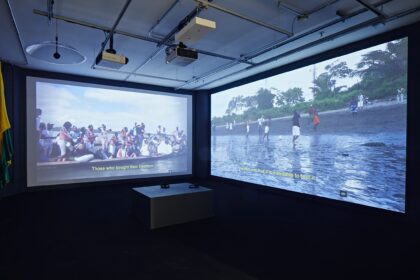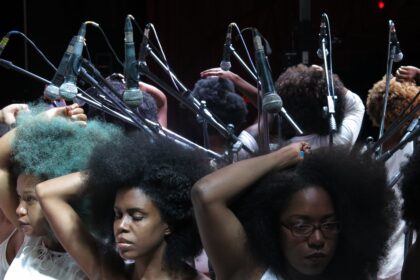Editorial | Spring 2022
The Western liberal Left needs to know that Islamic law can become a dead weight on societies hungering for change. The Left should not let itself be seduced by a cure that is perhaps worse than the disease.
“Atoussa H.,” Le Nouvel Observateur (November 6, 1978)
The quote above is from an exchange that occurred between Michel Foucault and an Iranian woman living in Paris in response to a series of articles Foucault wrote for the prestigious Italian daily Corriere della sera in which he praised the unfolding Iranian Revolution. In Foucault’s view the Iranian Revolution represented the emergence of an entirely new problematic of political change which promised to transcend the disabling constraints of degraded, European models of revolutionary transformation. “We have to be there at the birth of ideas,” Foucault enthused, “the bursting outward of their force: not in books expressing them, but in events manifesting this force, in struggles carried on around ideas, for or against them.” [1] Where revolutionary change in the European imaginary remained mired in the soul-less authoritarianism of the Stalinist state, in Iran the political was fused with the spiritual (via Khomeini’s invocation of a messianic tradition of Shi’ite theology), providing the necessary ideological frame to mobilize the masses against both the chains of colonialism and the discursive strictures of modernism itself. It is notable that this critical response came from an Iranian feminist, since women played a central role in both the overthrow of the Shah and early efforts to contest the process by which Islamic fundamentalists sought to appropriate the revolution and destroy their former secular allies on the left. In fact, it was a mass demonstration led by female activists in Tehran and Qom in March 1979, associated with International Women’s Day, that triggered the first open attacks on leftists and feminists by Khomeini’s regime. The women were protesting Khomeini’s imposition of mandatory hijabs (“We made the Revolution for Freedom, But Got Unfreedom”), when they were physically attacked by members of the regime’s newly formed paramilitary militias, the predecessors of today’s Basij and the Gasht-e Ershad or “morality police” [2]. It is precisely the ongoing effort by the Iranian state to control public space and expression that has given rise to remarkable new body of improvisational public performance by women who risk flogging and detention to dance and sing in subways, parks and city streets. This is a practice that Saba Zavarei, the guest editor of this issue, has contributed to through the creation of Radio Khiaban or “street radio,” a platform for recordings by women who sing in public. The project originated with Zavarei’s own surreptitious singing performance in a famous mosque in Isfahan. [3]
Rather than the herald of a new and more emancipatory form of world revolution, Iran in 1978 was simply the precursor of what would soon emerge as a global movement towards theocratic fundamentalism, which todays runs from evangelical Christianity in the United States, to the Hindutva movement in India, to Netanyahu’s long-term alliance with the ultra-Orthodox Shas party in Israel, and beyond. These movements typically emerge in conjunction with revived forms of ethnically-based nationalism (jati in India, white supremacy in the U.S., etc.) and seek to mobilize the working-class by appealing to fundamentalist cultural values and identities. They exist, then, in close correlation with the revival of neo-fascist and nationalist movements across Europe, which are highly dependent on a histrionic form of patriarchal masculinity. It is sobering to note the speed with which new forms of fundamentalist authoritarianism have spread over the past two decades. It is equally sobering to note the extent to which they continue to define themselves through the control and repression of women’s bodies (evidenced by the recent arrest of a women in Texas who suffered a miscarriage, and is being charged with murder). In this respect, Iran offers us a crucially important perspective on the nature of an established theocratic state. We have much to learn from the artists and activist who have sought, in varying ways, to challenge this oppressive structure.
For this issue of FIELD Saba Zavarei has assembled a remarkable collection of contributors writing on a range of creative, curatorial and critical practices in contemporary Iran. Saba herself has contributed an important analysis of the choreographic politics of public dance and performance. Helia Darabi examines the emergence of new forms of critical, site-specific art within the increasingly complex institutional structures of the Tehran artworld during the 1990s and 2000s. Azadeh Ganjeh describes her work in public performance in Tehran, drawing on the traditions of Boalian theater to involve spectators in ongoing dialogues about pressing cultural issues. Pouria Jahanashad discusses the complex meaning of “political art” in contemporary criticism, grounding her analysis in a reading of “informal” art practices in Iran operating in urban space. Shahram Khosravi explores the persecution of the nomadic Bakhtiari people, through an analysis of efforts to appropriate their cultural history in contemporary Iran. Elham Puriya Mehr examines the political potential of activist curatorial practice, using the example of Club 29 in Tehran to analyze the tension between intervention and institutional appropriation. Khosravi Noori provides an illuminating meditation on the relationship between liberation in Palestine and the often-opportunistic appropriation of the First Intifada by the Iranian government. Finally, Narciss Sohrabi expands on this analysis with her discussion of the transformative power of street art and graffiti in Iran during and after the 2009 uprising. We are extremely grateful to Saba for her tireless work in developing this special issue, and to her contributors for their invaluable insights, and the risks that they have taken, and continue to take, in registering their dissent.
Notes
[1] Janet Afary and Kevin B. Anderson, Foucault and the Iranian Revolution: Gender and the Seductions of Islamism (Chicago: University of Chicago Press, 2005), p.3.
[2] Ibid., p.111.
[3] See Bria Dinkins, “Interview with Saba Zavarei,” FIELD #17 (Winter 2021)











